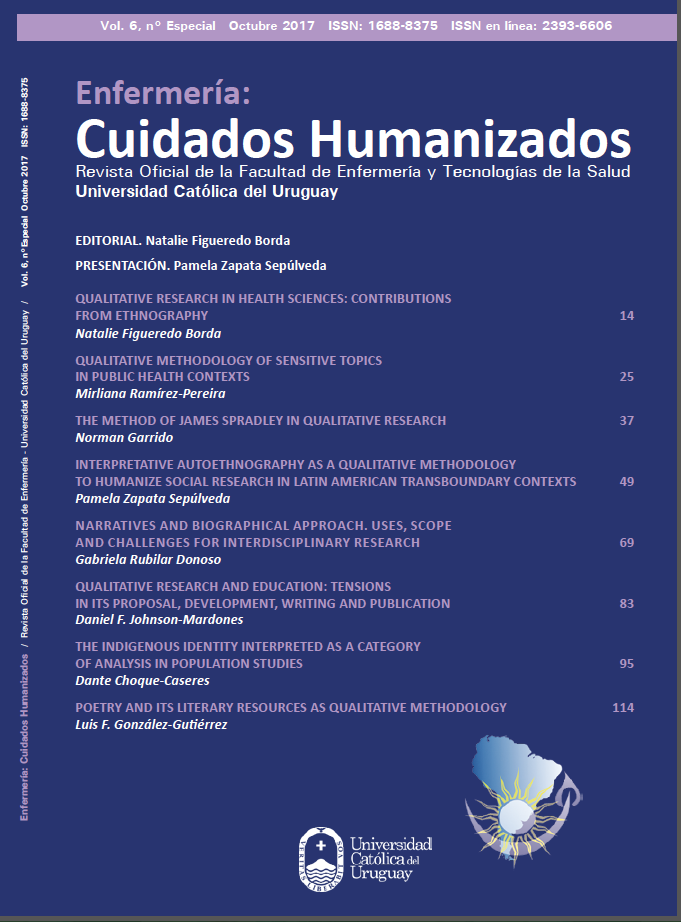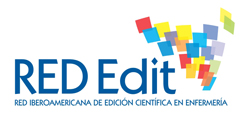A AUTO ETNOGRAFIA INTERPRETATIVA COMO METODOLOGIA PARA HUMANIZAR A INVESTIGAÇÃO SOCIAL EM CONTEXTOS FRONTERIZOS LATINOAMERICANOS
DOI:
https://doi.org/10.22235/ech.v6iEspecial.1451Palavras-chave:
Autoetnografia Interpretativa, Texto Experimental, Storytelling, Investigação Interdisciplinar, Migrações e Infância, Vida CotidianaResumo
Este trabalho tem como objetivo conectar o momento atual da Investigação Qualitativa, com o público da investigação qualitativa latino-americana, desde uma perspectiva interdisciplinar. Para isso serão expostos os principais e atuais conceitos que situam a IQ, especificamente a tradição da autoetnografia interpretativa, entendida como uma forma de investigação crítica que busca entre outros fins, sensibilizar, evocar e transformar realidades a partir da escrita experimental como forma de investigar. Esta metodologia amplamente empregada em projetos de investigações em países de língua inglesa, para abordar injustiças e problemas que afetam as vidas das pessoas sem voz, permite revelar conhecimentos desde o auto, o etno até o social. No presente trabalho, realiza-se uma resenha bibliográfica acerca desse método e um exemplo tomado a partir da experiência do trabalho de campo no projeto Fondecyt regular Nº 1160869 “Relações e interações sociais de crianças filhas de imigrantes e crianças chilenas nas escolas de Arica.” Discutiremos as aplicações e os aportes desta metodologia para a investigação social, desde a voz de uma mulher latino-americana que desenvolve sua linha de investigação em uma região fronteiriça, e como estas metodologias podem atender aos cuidados dos que participam desses estudos.
Downloads
Referências
2. Denzin NK. The Death of Data in Neo-Liberal Times. Paper presented at the International Congress of Qualitative Inquiry, Urbana–Champaign University of Illinois; May, 2016.
3. Denzin NK. Interpretive autoethnography (2nd ed.). Los Angeles: Sage; 2014.
4. Richardson L, St. Pierre E. Writing as a method of inquiry. In N. Denzin and Y. Lincoln (Eds.), The Sage Handbook of Qualitative Research. Thousand Oaks: Sage; 2005.
5. Reichardt CHS, Cook TD. Qualitative and quantitative methods in evaluation research. Beverly Hills: Sage; 1982.
6. Giroux HA. Beyond Dystopian Education in a Neoliberal Society. Fast Capitalism, 2013;10(1). Disponible en https://www.uta.edu/huma/agger/fastcapitalism/10_1/home.html
7. Spinak E. Quantitative Analyses of Scientific Literature and their validity for judging Latin American production. Bull. of PAHO. 1996; 29(4): 352-360 .
8. Ellis C. The ethnographic I: A methodological novel about teaching and doing autoethnography. Walnut Creek: AltaMira; 2004.
9. Richardson L. Writing: A method of inquiry. En NK Denzin, YS Lincoln (Eds.), Collecting and interpreting qualitative materials. Thousand Oaks: Sage; 1998. p. 345-371).
10. Richardson L. Getting personal: Writing stories. International Journal of Qualitative Studies in Education, 2001;14(1): 33-38.
11. Denzin NK. Interpretive biography. Newbury Park: Sage; 1989.
12. Conquergood D. Performance Studies Interventions and Radical Research. The Drama Review 2002;46:145-156. Disponible en http://www.csun.edu/~vcspc00g/301/psinterventions-tdr.pdf
13. Cayo G, Pérez L, Zapata L. Rueda de valoración familiar: un aporte constructivista a la intervención en familia. Límite: Revista de filosofía y psicología 2000(7): 27-37.
14. Zapata P. Efectos emocionales, afectivos y sociales de la privación de libertad y tortura por motivos políticos en Chile de 1973 a 1990 [Tesis doctoral]. Universidad de Salamanca, España; 2008.
15. Zapata-Sepúlveda P. Breaking my academic silence to start again making sense of why I am here, Moving from the thin to thick. Thinking about trauma and loss. Qualitative Inquiry, 2012; 18: 643-650.
16. Denzin NK. Programa. 13th International Congress of Qualitative Inquiry. University of Illinois at Urbana-Champaign. (actualizado 2017 abril 17) Disponible en http://icqi.org/wp-content/uploads/2013/02/QI2017-Final-Program-04172017.pdf
17. Aguirre-Armendáriz E. Cuando contar la tesis es hacer la tesis. Investigación y escritura autoetnográfica. México: Centro Latinoamericano de Pensamiento Crítico; 2015.
18. Benard S. Atrapada el provincia. Un ejercicio autoetnográfico de imaginación sociológica. México: Universidad Autónoma de Aguascalientes; 2014.
19. Diversi M., Moreira C. Betweener talk. Decolonizing knowledge production, pedagogy & praxis. Walnut Creek: Left Coast Press; 2009.
20. Pelias R. Performance: An Alphabet of Performance Writing. Walnut Creek: LeftCoast Press; 2014.
21. Brown RN, Carducci R, Kurby CR. Introduction. En RN Brown, R Carducci, CR Kurby (Eds.). Disrupting qualitative Inquiry: Possibilities and tensions in educational research. New York: Peter Lang; 2014. p. 1-31.
22. Pe-Pua R. Sikolohiyang Pilipino (Filipino psychology): A legacy of Virgilio G. Enriquez. Asian Journal of Social Psychology 2000; 3:49-71.
23. Denzin NK, Lincoln YS, Smith LT (Eds.). Handbook of Critical and Indigenous Methodologies. Thousand Oaks, CA: Sage; 2008.
24. Tamas S. Life After Leaving: The Remains of Spousal Abuse (Writing Lives: Ethnographic Narratives). Walnut Creek: Left Coast Press Inc.; 2011.
25. Nguyen NHC. Memory is another country: Women of the Vietnamese diaspora. Santa Barbara: Praeger; 2009.
26. Zapata-Sepúlveda P, López-Sánchez F, Sánchez-Gómez M. Concepción de mundo, aspectos contextuales y bienestar psicológico en chilenos supervivientes a experiencias de prisión y tortura por motivos políticos a más de 30 años de ocurridos los hechos. Universitas Psychologica 2009; 8(3):761-769.
27. Zapata-Sepúlveda P. The Power of Saying the Normally “Unsaid” as an Act of Empowering a Woman’s Voice in the Academia and the Fictional Parallel Side Behind This Power in a Global Era. Qualitative Inquiry, first online 2016. Disponible en http://journals.sagepub.com/doi/full/10.1177/1077800416659087
28. Zapata-Sepúlveda P. Experiencias de investigación, desafíos y limitaciones en el trabajo con inmigrantes y refugiados en la ciudad fronteriza de Arica. En: ME Tijoux (Ed.) Racismo en Chile: la piel como marca de la inmigración. Santiago: Editorial Universitaria; 2016. p. 141-158.
29. Zapata-Sepúlveda P. The overcoming of the attacks on freedom of speech through qualitative research. International Journal of Qualitative Research (en prensa).
30. Muñoz KL. Prefacio. En: KL Muñoz. Transcribing Silence. Culture, relationships, and communitation. Walnut Creek: Left Coast Press Inc. ; 2014: 7-14.
31. Zapata-Sepúlveda P, Tijoux ME, Espinoza-Lobos M. La investigación critica como una forma de romper el cristal entre las prácticas “comunes” en la academia pública chilena y el caso de los estudiantes migrantes latinoamericanos de color en nuestras salas de clases: un llamado a humanizar, un llamado a reflexionar. Diálogo andino 2015(47): 71-81. Disponible en https://dx.doi.org/10.4067/S0719-26812015000200008
32. Pelias R. Writing performance: Poeticizing the researcher's body. Carbondale: Southern Illinois University Press; 1999.
33. Pollock D. Performing writing. En: P Phelan J Lane (Eds.). The ends of performance. New York: New York University Press; 1998: 73-193.
34. Moreira C. I hate chicken breast: a tale of resisting stories and disembodied knowledge construction. International Journal of Qualitative Studies en Education 2012, 25(2): 151-167.
35. Bidou J, Guzmán P. Salvador Allende. [Video] Belgium: JBA Productions; 2004.
36. González S. El Dios Cautivo. Las Ligas Patrióticas en la chilenización compulsiva de Tarapacá (1910-1922). Santiago de Chile: LOM; 2004.
37. Tijoux M. (Ed.). Racismo en Chile: La piel como marca de la inmigración. Santiago de Chile: LOM; 2016.
Downloads
Publicado
Como Citar
Edição
Secção
Licença
Direitos de Autor (c) 2017 Enfermería: Cuidados Humanizados

Este trabalho encontra-se publicado com a Licença Internacional Creative Commons Atribuição 4.0.

















